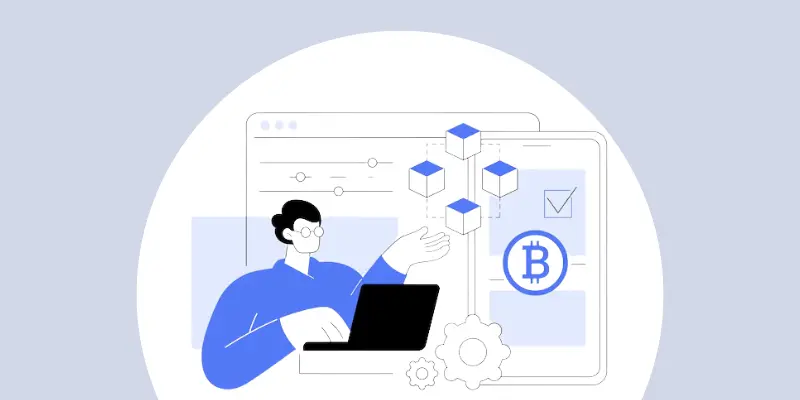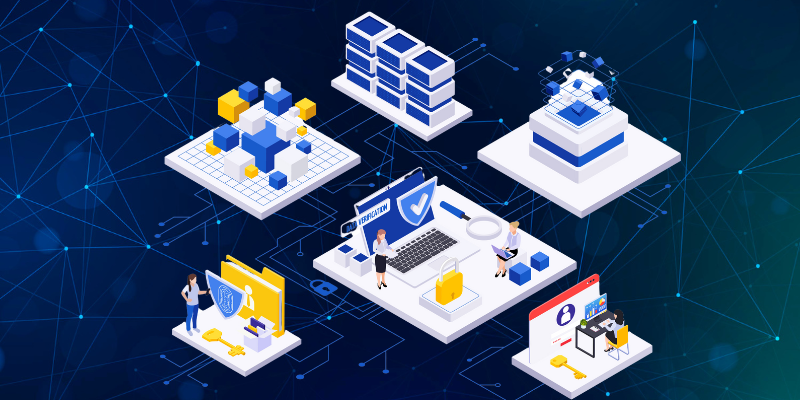Blockchain development is like trying to teach your grandma how to use a smartphone—it's complicated, but once you get the hang of it, the options are endless! At its core, blockchain app development involves building and managing decentralized apps (dApps) and smart contracts that leverage secure, open, and unchangeable ledger technology.
Choosing the right programming language is important in blockchain app development, especially when working with Internet of Things (IoT) applications or developing Android mobile apps. Each platform may require specialized blockchain solutions to improve speed and security.
This guide aims to help businesses, developers, and fans navigate the landscape of blockchain development services. It stresses the importance of smart contract development and dApp release to grasp the full potential of this new technology.
Key Considerations in Choosing a Programming Language for Blockchain Development
When starting on blockchain app development, choosing the right programming language is important for ensuring security, speed, and effective smart contract support. Here’s an organized outline of the key considerations:
1. Security
Security is non-negotiable in blockchain app development, especially in smart contract development. Languages like Solidity are designed to minimize the weaknesses inherent in smart contracts. They incorporate features that help protect against common attacks, ensuring that deals remain private and trustworthy.
2. Scalability
Scalability is important for handling growing transaction amounts, especially in apps that interact with IoT and Android platforms. Languages such as Go and Rholang are known for their ability to handle high flow, making them suitable for projects that require fast handling of numerous tasks.
3. Smart Contract Support
The importance of smart contract support cannot be overstated. Specific programming languages are created especially for this purpose, giving structures and tools that enable the development of efficient and reliable smart contracts. For instance, Vyper is another language that focuses on security and ease in smart contract development.
4. Community and Support
Finally, the community and support surrounding a programming language can significantly affect project success. Engaging with experienced coders who specialize in blockchain can provide priceless tools and speed learning. A strong developer community often leads to better debugging and new solutions, improving the overall development process.
By carefully considering these factors, companies can choose the most appropriate programming languages for their blockchain projects, ensuring effective implementation and long-term success. They can also hire blockchain developers or an experienced blockchain app development company
Top Programming Languages for Blockchain Development
Solidity
Solidity is the primary programming language for creating smart contracts on the Ethereum blockchain, making it a cornerstone for blockchain development companies offering related services. As a high-level, statically typed language, Solidity is specially built to cater to the unique needs of smart contract development, allowing developers to build self-executing agreements that automatically execute the terms contained within them.
Features of Solidity
-
-
Widespread Adoption: Solidity is widely known in the blockchain development industry, especially for its strong powers in smart contract development.
-
Security Focus: The language includes features that handle the fundamental security and transaction requirements of blockchain technology, helping reduce weaknesses.
-
Pros and Cons
Pros:
-
-
Ecosystem Integration: Being part of the Ethereum environment allows for smooth interaction with different decentralized apps (dApps) and services, making it highly flexible for IoT app development and Android mobile app development.
-
Rich Tooling: Tools like Remix IDE and Truffle Suite simplify testing and release processes.
-
Cons:
-
-
Platform Limitations: Solidity is mainly limited to Ethereum Virtual Machine (EVM) supported platforms, which can restrict its use in other blockchain settings.
-
High Gas Fees: Transactions on the Ethereum network can generate hefty gas fees, which may impact cost-effectiveness.
-
Best Use Cases
-
-
Solidity is suggested for– Developing dApps that require complex operations.
-
Develop smart contracts for different uses, from banking services to games.
-
Hire blockchain developers who specialize in Ethereum to leverage their skills successfully.
-
Key Tools
-
-
Remix IDE: An online tool that allows easy development, testing, and launch of smart contracts.
-
Truffle Suite: A complete system for building and handling Ethereum-based apps, offering tools for testing and release.
-
In summary, Solidity is a vital language for blockchain development, especially for building safe and efficient smart contracts on the Ethereum platform. Its features and community support make it an excellent choice for developers looking to create in the open space.
Rust
Rust is widely recognized for its memory safety and high speed, making it a popular choice for blockchain app development, especially in ecosystems like Solana and Polkadot. Designed to provide the speed needed for challenging applications, Rust excels in settings where performance and security are important.
Features of Rust
-
High Performance: Rust is ideal for demanding blockchain projects, particularly those involving Internet of Things (IoT) apps that require quick processing and low delay.
-
Memory Safety: The language ensures memory safety without counting on trash collection, which is important for IoT app development, where speed is key.
Pros and Cons
-
-
Pros: Rust is well-suited for fast-paced, large-scale blockchain app development projects due to its speed and dependability.
-
Its ownership model avoids common memory mistakes, improving security in distributed systems.
-
-
Cons: The language can be more difficult to learn compared to other blockchain development languages, possibly offering a challenge for new workers.
-
Best Use Cases
Rust is widely used in blockchain development services, especially for high-performance systems like Solana, where its skills greatly enhance scale and security.
Key Tools
-
-
Cargo: Rust’s package manager and build a system that improves project management.
-
Rust Compiler: Provides strong error checks and speed improvement.
-
Clippy: A linter that helps keep code quality by finding common mistakes.
-
In summary, Rust stands out as a strong tool for blockchain app development, giving unique benefits in security, speed, and freedom. Its rising acceptance in high-profile projects underscores its ability to shape the future of autonomous technologies.
Blockchain development is like trying to teach your grandma how to use a smartphone—it's complicated, but once you get the hang of it, the options are endless! At its core, blockchain app development involves building and managing decentralized apps (dApps) and smart contracts that leverage secure, open, and unchangeable ledger technology.
Choosing the right programming language is important in blockchain app development, especially when working with Internet of Things (IoT) applications or developing Android mobile apps. Each platform may require specialized blockchain solutions to improve speed and security.
This guide aims to help businesses, developers, and fans navigate the landscape of blockchain development services. It stresses the importance of smart contract development and dApp release to grasp the full potential of this new technology.
Emerging Programming Languages in Blockchain Development
Emerging programming languages are gaining ground in blockchain app development, offering unique features designed for specific use cases. Here’s a look at three famous languages:
Move
Developed by Facebook’s Diem, Move is intended for safe and transparent smart contract development. Its resource-oriented computing style allows developers to handle digital assets with improved safety and freedom. Move's strong typing and flexibility enable formal proof, making it ideal for apps that require high security. This language has gained fame beyond Diem, being adopted by other blockchains like Aptos and Sui.
Scrypto
Scrypto is specially made for the Radix network and designed for DeFi and IoT app development. It promotes ease and efficiency, allowing developers to build large applications that can handle complex financial activities safely. Scrypto’s design focuses on giving tools that cater to the unique needs of DeFi projects.
Motoko
Motoko, created by DFINITY, is designed for blockchain app development on Internet programming. It offers features that make it easy to build web apps directly on the blockchain, allowing fast launch and scale. Motoko’s syntax is meant to be simple while offering strong tools for handling state and asynchronous tasks.
Best Use Cases
These new languages are particularly suitable for special areas in blockchain app development, such as IoT app development and Android mobile app integration. They allow developers to create innovative solutions tailored to specific industry needs.
|
Language |
Primary Use Cases |
Key Strengths |
Limitations |
|
Solidity |
Smart contracts, dApps |
Developer-friendly, extensive tooling, EVM support |
Limited to EVM-compatible platforms, gas fees |
|
Java |
Android mobile apps, enterprise apps |
Object-oriented, robust libraries, platform-independent |
Slower performance compared to lower-level languages |
|
Python |
Prototyping, IoT app development |
Easy to learn, vast libraries for data analysis |
Less efficient for large-scale applications |
|
JavaScript |
Front-end dApps, hybrid apps |
Easy integration with web apps, extensive frameworks |
Limited use in core blockchain development |
|
C++ |
Core protocol development |
High performance, control over hardware resources |
Complexity can be challenging for new developers |
|
Go |
Enterprise solutions, private blockchains |
Fast compilation, concurrency support |
Smaller ecosystem compared to other languages |
|
Rust |
High-performance platforms |
Memory safety, efficient resource management |
Steeper learning curve |
|
Move |
Secure smart contracts |
Resource-oriented design for asset management |
Limited adoption outside specific ecosystems |
|
Scrypto |
DeFi and IoT app development |
Optimized for scalability and security |
Niche usage; less community support |
Conclusion
In conclusion, each programming language offers unique benefits suited to specific blockchain development projects. Solidity excels in smart contract development, while Java and Python are ideal for mobile app development and prototyping, respectively. C++ and Rust provide high speed for core protocol development, and new languages like Move, Scrypto, and Motoko cater to niche apps.
When choosing a language, consider the project scope—whether it’s blockchain development services or smart contract development. For best results, finding skilled mobile app developers or blockchain developers is important.
At JPLoft, we have the knowledge you need to meet your blockchain app development requirements successfully. Let us help you turn your idea into reality!












Share this blog